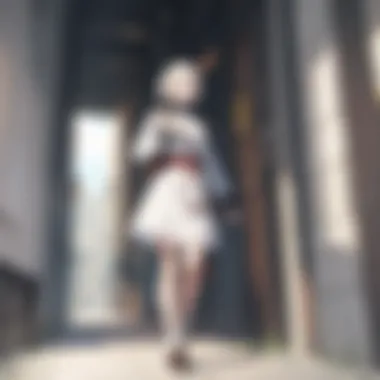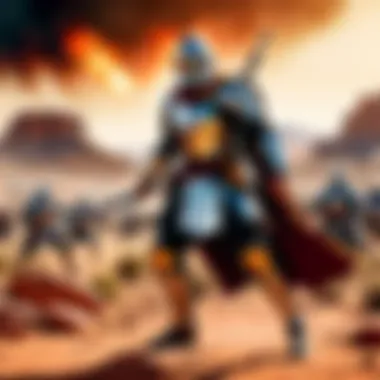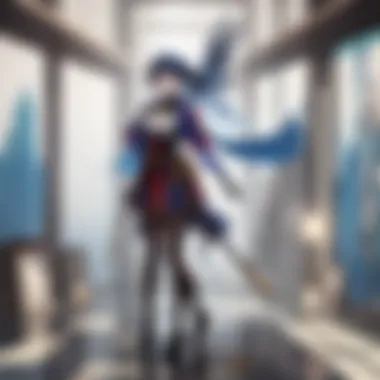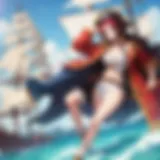In-Depth Analysis of the Lodos War in Anime


Foreword to the Series
The Lodos War is an esteemed entry in the domain of Japanese animated narratives, recognized for its compelling storytelling and rich character dynamics. Combining elements of fantasy and adventure, the series captivates its audience through an intricate world-building process that engages fans at multiple levels. Released in the late 1980s and early 1990s, it is an adaptation of the "Record of Lodoss War" novels, which serves as a foundation for the anime, manga, and other media formats that emerged thereafter. The series has been greatly received for its animation quality, narrative depth, and well-structured lore.
The context in which Lodos War was created reflects a growth period of anime as an entertainment medium, particularly within the fantasy genre. Set against a backdrop of rising popularity for high-fantasy storytelling, the series offers a unique blend of classical themes combined with modern anime aesthetics.
Audience reception to Lodos War has been significantly favorable, garnering a dedicated fan base over the years. The intricate character relationships and moral dilemmas depicted within the series resonate deeply, drawing viewers back for multiple viewings and discussions. Many in the anime community regard it as a cornerstone of fantasy anime, earning a prominent place in discussions surrounding anime's evolution.
"The enduring appeal of Lodos War lies in its ability to blend traditional storytelling with innovative animation techniques, captivating both old and new fans alike."
Overall, the analysis of the Lodos War offers a comprehensive understanding of its character developments, thematic elements, and cultural significance. The subsequent sections will further delve into the skilled staff and cast behind the scenes, an examination of music that enhances its storytelling, plot intricacies, and the broader impact on the anime landscape.
Preamble to the Lodos War
The Lodos War stands as a remarkable journey within the landscape of Japanese animation and fantasy narratives. It embodies a unique confluence of genre conventions and innovative storytelling, making it an essential topic for both enthusiasts and academics interested in anime's evolution. Understanding the Lodos War allows for deeper appreciation of character complexity and thematic elements prevalent in anime. This introductory section lays the foundation for a detailed exploration of its historical, narrative, and cultural significance.
Historical Context
To grasp the significance of Lodos War, one must first consider its historical backdrop. When it was released, anime was undergoing various transformations. The late 1980s and early 1990s witnessed a surge of fantasy genres that drew from both Eastern and Western influences. During this time, works like Lodos War were influenced by tabletop role-playing games and classic fantasy novels.
Lodos War, originally a series of novels by Ryō Mizuno, adapted to anime, further showcased the genre's unique traits. This adaptation reflected the growing popularity of fantasy themes in Japanese media. The tension between the traditional narrative structures and emerging innovative narratives is in the heart of the Lodos War. By framing its narrative in a world of conflict, magic, and camaraderie, it presented viewers with a rich tapestry of storytelling that has had lasting implications in the anime genre.
The world-building reflects a nuanced understanding of fantasy tropes. It draws from both the rich heritage of Japanese folklore and general fantasy literature. Each character represents specific archetypes that resonate with fans across various cultures.
Overview of the Anime Genre
The realm of anime is extensive and multifaceted, encompassing a diverse array of genres and themes. Positioned within this larger context, the Lodos War is significant in how it illustrates the complexity of anime. The genre itself has evolved from simple, episodic entertainment to intricate narratives that engage in deeper explorations of morality, identity, and relationships.
Specifically, the fantasy genre in anime has made significant strides. Early works tended to focus on simplistic plots and hero-villain dynamics. However, with Lodos War, fans began to see a shift. This series offers richer character development, intertwining personal motivations with broader themes of conflict.
The Lodos War adds a notable layer to the anime genre’s evolution. It serves as a bridge that showcases both established tropes and progressive storytelling. As viewers, we encounter multifaceted characters grappling with their desires, strengths, and weaknesses. This depth invites audiences to reflect on their own experiences and moral perspectives.
"The Lodos War exemplifies the transformative journey of anime, from standard narratives to complex character studies that question the very essence of conflict and alliance."
In summation, the Lodos War occupies a critical place in anime history, reflecting broader trends while simultaneously paving the way for future explorations in storytelling. Understanding its context not only enriches our viewing experience but also elevates the discourse surrounding anime narratives in the contemporary landscape.
Plot Summary of the Lodos War
The plot of the Lodos War serves as an essential foundation for understanding its narrative complexity and character arcs. This section focuses on the evolution of the storyline, pointing out key conflicts and developments that engage viewers. It delves into how the plot intertwines themes of power, loyalty, and morality, thereby enhancing the depth of the series. Each segment of the plot not only contributes to the overall narrative but also honors the genre's ancestor motifs, appealing to fans of anime and manga.
Initial Conflict
The initial conflict in Lodos War establishes the stakes and introduces main characters. This conflict is pivotal as it sets the tone for the entire series. The clash between different factions is rooted in a quest for dominance over the mystical land of Lodoss. Notably, the struggle between the forces of good and evil emerges here, characterizing heroes such as Parn and their adversaries, including the dark sorceress Taris.
Through this conflict, viewers perceive the underlying motivations of the characters and how their pasts are intertwined with the present struggles. The differing ideals and objectives present a rich tableau of relationships that are further explored throughout the story and provides a clear understanding of the tensions to come.
Key Events Unfolding
As the story progresses, various key events unfold that deepen the narrative. Parn's journey is central, showcasing his growth from a naive youth to a seasoned hero. Alongside him, supporting characters like Deedlit, an elven priestess, and the wise figure of Ghim serve to provide layers of support, wisdom, and conflict.


The unfolding of these events points to larger themes, such as unexpected alliances that shift the power dynamics within Lodoss. One notable event is the shocking betrayal by trusted allies. Such incidents compel the audience to reconsider their loyalties and to analyze the moral dilemmas faced by the characters.
Climactic Moments
Climactic moments in Lodos War are strategically crafted to evoke a strong emotional response. The series features significant battles that not only test the characters but also underscore crucial turning points in the plot. One such moment occurs when Parn faces Lord Ashram, a formidable antagonist. This confrontation acts as a culmination of tensions built throughout earlier episodes.
It is in these moments that the stakes reach their peak, forcing characters into tough decisions that shape the story's direction. These confrontations provide exciting opportunities for character revelations and thematic explorations.
Resolution of Conflicts
The resolution of conflicts is an important aspect of the Lodos War's plot structure. The series embraces closure, allowing characters to confront their respective journeys and evolve. As the battles come to an end, the consequences of characters' actions lead to significant transformations.
Notable resolution occurs when Parn ultimately confronts his ideals, balancing personal aspirations against the greater good. This moment of reflection is essential for character growth, serving as a means of tying up narrative threads established earlier. The series ends on a note that emphasizes the cyclical nature of conflict, hinting at the continuous struggle between light and darkness.
The plot summary of the Lodos War reveals that it is much more than an adventure tale. It intertwines character growth, moral dilemmas, and the implications of power in a cohesive way. These elements ensure that not only fans but also newcomers to the series find something valuable in the storyline.
Character Analysis
Character analysis is a vital aspect of examining the Lodos War. The arc's strength lies significantly in its multidimensional characters, whose motivations and developments drive the plot forward. Understanding these characters offers deeper insights into the themes and conflicts portrayed. It allows the audience to connect with the narrative on a more profound level. Moreover, analyzing characters enhances appreciation for the intricate writing and development within the anime.
Protagonists and Their Motivations
The protagonists in the Lodos War stand out against a backdrop of conflict and chaos. Each character embodies a distinct set of motivations, spurring them into action throughout the storyline.
For instance, the character of Parn showcases the classic underdog journey. He desires to prove himself and protect those he loves. This journey is fueled by a mix of ambition and duty. Another key protagonist, Deedlit, reflects the complexities of her own motivations, balancing personal desires and broader implications of her actions. She often grapples with the weight of responsibility that come with her powers.
These protagonists are not merely drivers of the plot; they also represent various aspects of human experience. Their journeys are relatable, touching on themes of courage, love, and sacrifice. Such complexities allow audiences to resonate with their struggles, rendering the narrative impactful.
Antagonists and Their Influence
In contrast to the protagonists, the antagonists in the Lodos War serve critical roles in shaping the narrative. Their influence often pushes protagonists to confront their limits and grow.
Ghim, for example, emerges as a strong antagonist whose motivations stem from a desire for power and control. His actions challenge the protagonists, creating significant conflict that reflects broader questions of morality and ambition. Another notable figure, the dark sorceress Kardis, embodies pure chaos. She acts not just out of personal gain but demonstrates how the desire for power can lead to apparent destruction.
The presence of these antagonists enhances the depth of the story. They force protagonists to evolve, encouraging viewers to examine their values and choices. As a result, the Lodos War explores more existential themes of good and evil, providing a rich tapestry for analysis.
Supporting Characters
Supporting characters in the Lodos War are not secondary; they are integral to the narrative's richness. Each plays a role that complements the protagonists and antagonists, often bringing a unique perspective to the central themes.
Characters like Eto and Olwen exemplify loyalty and friendship. They not only contribute to the protagonists' journeys but also highlight critical life lessons throughout the series. These relationships reveal the importance of collaboration and unity in overcoming adversity.
Additionally, the diverse backgrounds of supporting characters add layers to the story. They reflect the complex world in which the narrative unfolds, thus enhancing the audience's immersion in the Lodos War universe.
Overall, character analysis in the Lodos War showcases the breadth of human experience through its protagonists, antagonists, and supporting roles. It reveals how their complex motivations and interactions can enhance thematic depth and overall narrative effectiveness. As such, understanding these characters becomes essential in grasping the larger implications of the anime's storyline.
Themes and Motifs
The themes and motifs in the Lodos War are central to understanding its narrative and emotional impact. These elements not only drive the plot but also engage the audience on a deeper level. Each theme intertwines with character development, fostering a rich narrative that resonates with viewers. The exploration of complex themes enhances the viewing experience, allowing fans to analyze character actions and motivations comprehensively.


Conflict and Resolution
Conflict is a pivotal element in the Lodos War. From the onset, the narrative presents various conflicts that propel the storyline. The struggle between opposing kingdoms, the clash of ideals among characters, and internal conflicts within the protagonists create a dynamic environment. Resolution doesn’t come easily. Characters must confront their fears and make significant sacrifices. This struggle leads to a deeper understanding of their roles and responsibilities in the world they inhabit.
Key conflicts include:
- Interpersonal struggles among allies that test their relationships.
- The overarching battle for power that affects entire nations.
- Internal battles within characters who grapple with their own morals and choices.
The resolution of these conflicts often results in notable character growth. Watching characters evolve through challenges provides a satisfying payoff for viewers, making the emotional highs and lows feel authentic and impactful.
Friendship and Loyalty
The motifs of friendship and loyalty are crucial in the Lodos War. Characters often rely on bonds with others to confront adversities. This aspect cements interpersonal relationships as vital components of the narrative. Loyal alliances are not without their challenges. Betrayals and misunderstandings test friendships, but ultimately, these challenges strengthen the characters' resolve.
Important aspects of friendship in the anime include:
- How loyalty influences character decisions and actions.
- The sacrifice individuals make for friends.
- The notion that true friendship is often tested in times of crisis.
Reflecting on these themes allows viewers to appreciate the intimate connections that drive the characters forward. It illustrates how friendships provide the support needed to challenge the status quo, encouraging audiences to think about their own relationships.
Power and Responsibility
The interplay of power and responsibility emerges as a recurring motif in the storyline. Those who seek power often confront the repercussions of their desires. Characters are frequently faced with moral dilemmas that highlight the weight of their choices. The Lodos War effectively explores how different characters respond to their positions of power, whether chosen or inherited.
Key considerations include:
- The ethical implications of wielding power.
- How responsibility shapes character identity and growth.
- The consequences of power struggles on wider society.
Through these observations, the anime critiques the allure of power while simultaneously emphasizing the importance of humility and accountability. This dichotomy enriches the overarching narrative and challenges viewers to consider the cost of ambition in their own lives.
Artistic Style and Animation Techniques
The artistic style and animation techniques employed in the Lodos War are crucial to understanding its overall impact. Not only do they enhance the storytelling, but they also bring the world and its characters to life in a unique way. These visual elements contribute significantly to the narrative and emotional arc of the story, creating an immersive experience for viewers.
Character Design
Character design plays a vital role in defining the personalities and motivations of the characters in the Lodos War. Each character is uniquely crafted to reflect their role and journey within the story. For instance, the protagonists often exhibit more angular and striking features, signaling their strength and determination. In contrast, antagonists tend to be designed with more somber and rounded elements, embodying their complexity and moral ambiguity. Effective character design facilitates audience connection, encouraging viewers to empathize with their struggles and triumphs.
Moreover, color choices in the character palettes also contribute to the characterization. Bright, vibrant colors might align with characters that embody hope, while darker tones could suggest hidden intentions or past traumas.
Environmental Aesthetics
Environmental aesthetics set the backdrop for the narrative and also enhance the emotional tone. The landscapes in the Lodos War are crafted with intricate detail, providing a sense of realism and immersion. The diverse settings, from urban environments to nature-infused realms, all serve to accentuate thematic elements of the story. The meticulous attention to detail in these environments reflects the culture and history of the world within the anime, reinforcing viewers' understanding of the stakes involved in the characters' conflicts.
Textures, lighting, and atmospheric effects are employed effectively to create tension or serenity, depending on the scene's requirements. A misty backdrop can convey mystery, while sunlight flooding a battlefield highlights the impending danger.
Animation Quality
Animation quality is pivotal in bringing the artistic vision to fruition. The fluidity and precision in animation impact the overall viewer experience, particularly during action sequences and emotional exchanges. The Lodos War is known for its high-quality animation that combines both traditional and modern techniques. Smooth transitions and detailed movements enhance the dynamic interaction of the characters, making battles more intense and personal moments more poignant.
"High animation quality not only caters to visual appeal but also elevates the storytelling, allowing audiences to engage deeply with the narrative."
The meticulous care taken in hand-drawn elements, combined with digital enhancements, results in a distinctive aesthetic that appeals to both classic anime fans and new viewers alike. Animation techniques are crafted to emphasize character emotions, allowing subtle facial expressions and body language to convey profound messages, hence enriching the narrative experience.


Overall, the integration of artistic style and animation techniques in the Lodos War contributes to its relevance and enduring significance in anime culture.
Music and Sound Design
The role of music and sound design in the Lodos War cannot be overstated. It serves as a fundamental element that enhances the overall viewing experience. The way music intertwines with visuals contributes to the emotional depth of the series. Well-composed soundscapes can guide audiences through the emotional journey of characters. The interplay of auditory elements creates a rich atmosphere that deepens engagement.
Opening and Ending Themes
The opening and ending themes of the Lodos War are critical in setting the tone for the series. They introduce viewers to the narrative's emotional landscape. The opening theme often encapsulates the series' essence, offering glimpses of key characters and themes that will be explored. Conversely, the ending theme provides a reflective tone, allowing the audience to digest the episode's events.
These musical pieces are not merely background elements; they serve as thematic anchors. The opening theme’s melody can create anticipation, while the ending theme often evokes a sense of closure or reflection. The choice of instrumentation and vocal performance further enhances this effect, making it resonate with viewers.
Background Score
The background score plays a vital role in the Lodos War’s storytelling. It is crafted to align with the mood of specific scenes, elevating the impact of pivotal moments. The score employs various instruments to evoke different emotions. For instance, orchestral segments can amplify a sense of urgency during conflicts, while softer melodies can portray vulnerability during character-driven scenes.
The ability of music to influence the audience's perception is crucial. A well-timed musical cue can heighten suspense or underscore emotional revelations. Listeners may find themselves more attuned to character developments, as the score often signals shifts in tone or mood. In this manner, its contribution to the narrative cannot be overlooked.
Impact on Narrative
Ultimately, the music and sound design contribute significantly to the Lodos War's narrative structure. They create an immersive experience that fosters emotional connections between viewers and characters. As a result, the narrative's messages are reinforced through auditory cues.
"Sound is often the unseen element of storytelling that shapes our perceptions of character journeys and thematic depth."
By weaving music into the narrative fabric, the creators of Lodos War ensure that vital themes such as conflict and resolution are profoundly felt. Thus, it solidifies the impact of the story, ensuring that viewers remain engaged throughout.
Cultural Significance
The cultural impact of the Lodos War extends beyond its narrative and characters. This series has carved a place in the anime landscape, serving as a reference point for future works in the genre. Understanding its cultural significance involves examining how it has influenced storytelling techniques, character archetypes, and audience expectations in anime.
Influence on Other Works
The Lodos War has inspired numerous creators both within and outside of Japan. Its blend of complex narratives and rich character development is evident in many subsequent anime series. For instance, works like Sword Art Online and Fate/stay night exhibit similar thematic elements, merging personal stakes with broader conflicts, a hallmark of the Lodos War. Storytellers often cite it as a benchmark for achieving intricate world-building combined with personal character arcs.
Additionally, elements of its lore can be seen in various role-playing games that emphasize character growth amid larger mythical landscapes. The frameworks established in the Lodos War, such as the construction of a fantasy world rife with political struggles, continue to influence game design and storytelling in modern media. Notably, its influence extends to graphic novels and manga as well, with many stories echoing its thematic motifs and plot structures. This cross-medium impact signifies the series’ enduring significance.
Fan Communities and Fandom
The Lodos War has fostered a vibrant fan community, which has greatly contributed to the series' longevity. Fandom surrounding its characters and stories thrives on platforms such as Reddit and Facebook. These online congregations serve as spaces for discussion, analysis, and appreciation of the series, helping new audiences discover its depth. Fans engage in creating fan art, fan fiction, and even speculative discussions about possible future narratives, demonstrating a dynamic interaction with the source material.
Moreover, conventions and meetups rooted in the Lodos War have become common. These gatherings allow fans to celebrate the series together, sharing interpretations and personal stories linked to the show. The community’s passion not only enriches their individual experiences but also maintains the relevance of the Lodos War within the broader anime culture.
The End
The conclusion serves as a pivotal component in understanding the Lodos War, encapsulating the essence of the narrative and its larger implications in the realm of anime. A comprehensive analysis delves into multiple layers of significance which include thematic resonances, character arcs, and cultural footprints that this series leaves behind. Overall, the conclusion synthesizes the myriad elements explored throughout the article, shedding light on the importance of context in appreciating Lodos War.
Final Thoughts on the Lodos War
In retrospect, the Lodos War stands out not just as a compelling narrative, but as a multifaceted exploration of themes that resonate with a wide audience. Its blend of character complexities and intricate plotting offers valuable insights into human experiences such as sacrifice, friendship, and conflict. Given the depth present across various episodes, it is evident that the creators of Lodos War had a vision that transcended typical storytelling found in anime. The emotional journeys of the characters evoke empathy and reflection, allowing the audience to connect on a personal level.
"To truly appreciate the Lodos War, one must engage with its themes and characters, understanding their motivations and fears."
Future Implications for Anime Narratives
As the anime genre continues to evolve, the influence of works like Lodos War is undeniable. It paves the way for future storytellers to explore deeper themes and complex character development. Such narratives encourage a break from conventional storytelling approaches, urging the industry to challenge boundaries. This foundation allows for innovative narratives that can enrich viewers’ experiences, directing new discussions among fans and critics alike.
Thus, the legacy of Lodos War serves as a touchstone for aspiring creators and established makers within the anime community. It exemplifies the potential of animated narratives to convey significant messages while engaging audiences comprehensively. This journey through Lodos War demonstrates the crucial place such works hold in shaping the storytelling landscape of anime traditions.















